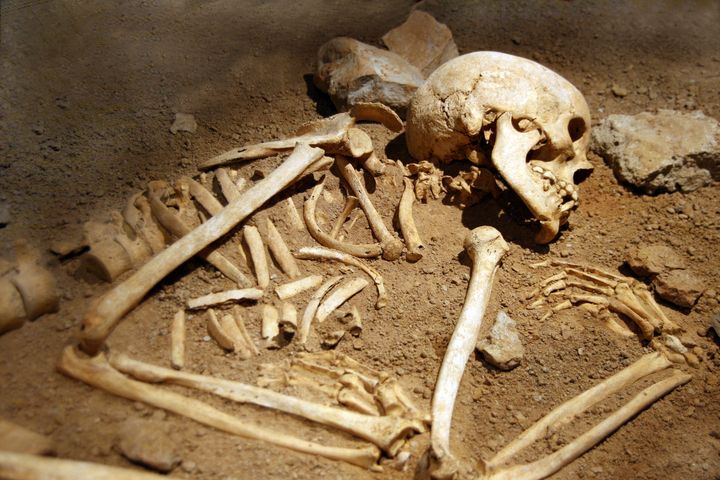
One million years ago, our ancient ancestors went around hunting and eating each other because cannibalism was a highly profitable survival strategy, scientists have said.
Homo antecessor is a proposed species of archaic human thought to have lived between 1.2 and 800,000 years ago. Members of this species have also been called the "oldest human cannibals." Fossils discovered at an archaeological site contain "unquestionable signs of cannibalism," researchers from Spain's National Research Center on Human Evolution (CENIEH), said in a study looking at their hunting behavior.
The paper, published in the Journal of Human Evolution, analyzed this case of cannibalism within a framework of optimal foraging—weighing hunting humans and other animals in terms of the nutritional benefits they offered against the cost of killing and processing the body. These ancient human hunters, the team say, would have wanted to get the maximum benefit for the minimum cost.
"Cannibalism is an old and widespread human practice; however, the causes and meaning of consuming other humans are still hotly debated," study authors Jesús Rodríguez, Ana Mateos and Guillermo Zorrilla wrote. "Several explanations are possible for cannibalistic behavior, ranging from social and cultural motivations to purely nutritional causes."
In previous research, British archaeologist James Cole worked out the nutritional value of the human body and applied it to the Palaeolithic record. His findings, published in Scientific Reports, suggested that cannibalism was not necessarily just driven by the need for nutrition—the value of human meat calorie-wise was not as strong as other potential prey at the time. This, Cole suggested, indicated there were also social and cultural reasons for prehistoric cannibalism.
Commenting on the latest study, Cole, who was not involved in the research, told Newsweek the findings help refine the reasons for cannibalism among our ancient ancestors—namely the behavioral motivations of cannibalism using optimal foraging theory.
"Such an approach is refreshingly unique and demonstrates that despite issues with time depth, we can still generate new interpretations of the complex behaviors that our hominin ancestors engaged in," he said. "The nutritional interpretation certainly seems well supported based on the evidence presented within the paper. Although, it is perhaps worth remembering that any social or cultural motivations for...cannibalism may not be fully archaeologically visible even though in this instance the hominin remains seem to have been fully consumed."
In the latest paper, the scientists at CENIEH looked at "Optimal Foraging Theory"—which weighed up the cost/benefit of a hunt—for a range of large mammals and hominins. They also took into account prey choice and abundance.
Findings showed humans were "overrepresented" in the environment, meaning they were likely encountered at a higher rate, "as may be expected if the cannibalized individuals belonged to the same group as the foragers," the scientists wrote. While their nutritional value may not have been as good as other fauna available at the time, the chance of encountering another human made them an easy meal.
"Our analyses show that Homo antecessor, like any predator, selected its prey following the principle of optimizing the cost-benefit balance, and they also show that, considering only this balance, humans were a 'high-ranked' prey type," Rodríguez said in a statement. "This means that, when compared with other prey, a lot of food could be obtained from humans at low cost.
"For Homo antecessor it was easier to encounter a human than another animal. One of the possible explanations for this high encounter rate between humans could be that the cannibalized cadavers were those of members of the group who had died from different causes."
Uncommon Knowledge
Newsweek is committed to challenging conventional wisdom and finding connections in the search for common ground.
Newsweek is committed to challenging conventional wisdom and finding connections in the search for common ground.
About the writer
Hannah Osborne is Nesweek's Science Editor, based in London, UK. Hannah joined Newsweek in 2017 from IBTimes UK. She is ... Read more





